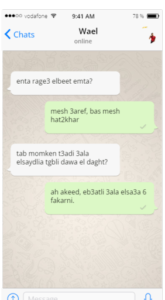Today we are back with Egyptian Arabic Conversation 11.
In each Conversations post, we will provide you with:
- a screenshot from an actual conversation between two Egyptians
- the translation of each line of text, including English, Franco and Arabic script
- context on the conversation and further explanation
We think learning Egyptian Arabic from actual, authentic conversations between Egyptians is both fun and effective. We hope you like it too!
Let’s get started with Egyptian Arabic Conversation 11: Returning Home.
Egyptian Arabic Conversation 11: Returning Home
As always, we will start out with a screenshot of a WhatsApp conversation in Egyptian Arabic.

The conversation is in Franco, but we put the actual Arabic below.
Before getting started with this Conversations post, be sure to check out our post on writing in Franco Arabic.
Egyptian Arabic Conversation 11: Translation
When are you returning home (Lit. You (masc.) return the house when)? : enta rage3 elbeet emta?
انت راجع البيت امتى؟
I don’t know but I won’t be late. : mesh 3aref, bas mesh hat2khar.
.مش عارف بس مش هتأخر
Well, can you pass by the pharmacy to get me the blood pressure medicine? : tab momken t3adi 3ala elsaydlia tgbli dawa el daght?
طب ممكن تعدي على الصيدلية تجبلي دوا الضغط؟
Yes of course, send me a reminder around 6. : ah akeed, eb3atli 3ala elsa3a 6 fakarni.
.اه اكيد ..ابعتلي على الساعة 6 فكرني
Egyptian Arabic Conversation 11: Important Vocabulary
When are you returning home? : enta rage3 elbeet emta?
انت راجع البيت امتى؟
We will start with the very first phrase.
The verb راجع means “return” but you can translate it to be “coming”, as in “coming home.”
I don’t know… : mesh 3aref…
…مش عارف
Always a good phrase to know.
A woman would say mesh 3arefa (مش عارفه).
I won’t be late. : mesh hat2khar.
.مش هتأخر
The word late as an adjective is mot2khar (متأخر).
Turn that into a verb, and put it in the future tense (“going to be late) and you get هتأخر.
Quick note – if you want to say something in the Egyptian Arabic future tense, you need to put the letter ه at the beginning of the verb. Actually pretty easy to do.
Well, can you…? : tab momken…?
طب ممكن…؟
This is a common way to start out a question when you are asking anybody (man or woman) to do something for you.
Tab comes from the word tayeb, which has many different uses.
Also included in this phrase is the word moomkin, which is essential in Egyptian Arabic.
Blood pressure medicine. : dawa el daght.
.دوا الضغط
Just in case you ever need to know how to say it.
(Tip: check out the most well-known pharmacies in Egypt just in case.)
Yes of course. : ah akeed.
.اه اكيد
This is a very common phrase to use.
It’s not a verb so is consistent between both men and woman speakers.
Send me a reminder. : b3atli fakarni.
.ابعتلي فكرني
A solid informal phrase when chatting with friends.
Context + Further Explanation
We can assume this is an informal conversation between people who live together.
Because the verbs from both speakers are conjugated in the masculine form, it’s two men. However, as we point out in the phrases, there are only a few words you would say differently from the perspective of female speakers.
(Be sure to read up on verb conjugation for present tense verbs (1-10) and (11-20) for a more in-depth background on how verbs change depending on the speaker).
…
Happy learning,
Cleo Lingo


a big thank you ! i’m studying arabic ( ! بشويش ) . i live on an island in maine and run a boat with little time for study -but i’m determined . your notes are a great encouragement. thank you.
nick
Amazing! Keep it up, it’s definitely worth it! 😀